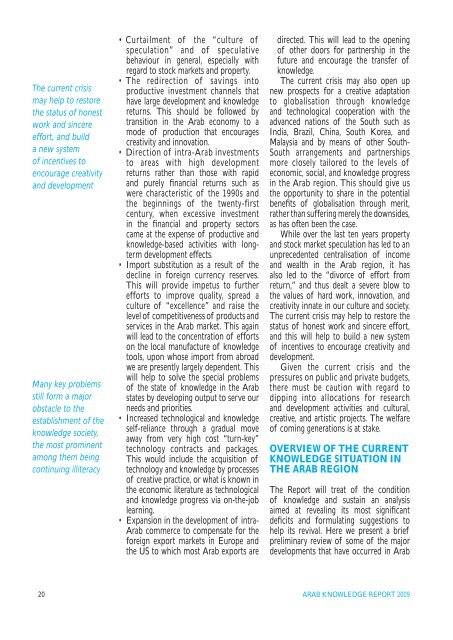Arab Knowledge Report 2009: Towards Productive
Arab Knowledge Report 2009: Towards Productive
Arab Knowledge Report 2009: Towards Productive
- No tags were found...
You also want an ePaper? Increase the reach of your titles
YUMPU automatically turns print PDFs into web optimized ePapers that Google loves.
The current crisismay help to restorethe status of honestwork and sincereeffort, and builda new systemof incentives toencourage creativityand developmentMany key problemsstill form a majorobstacle to theestablishment of theknowledge society,the most prominentamong them beingcontinuing illiteracy• Curtailment of the “culture ofspeculation” and of speculativebehaviour in general, especially withregard to stock markets and property.• The redirection of savings intoproductive investment channels thathave large development and knowledgereturns. This should be followed bytransition in the <strong>Arab</strong> economy to amode of production that encouragescreativity and innovation.• Direction of intra-<strong>Arab</strong> investmentsto areas with high developmentreturns rather than those with rapidand purely financial returns such aswere characteristic of the 1990s andthe beginnings of the twenty-firstcentury, when excessive investmentin the financial and property sectorscame at the expense of productive andknowledge-based activities with longtermdevelopment effects.• Import substitution as a result of thedecline in foreign currency reserves.This will provide impetus to furtherefforts to improve quality, spread aculture of “excellence” and raise thelevel of competitiveness of products andservices in the <strong>Arab</strong> market. This againwill lead to the concentration of effortson the local manufacture of knowledgetools, upon whose import from abroadwe are presently largely dependent. Thiswill help to solve the special problemsof the state of knowledge in the <strong>Arab</strong>states by developing output to serve ourneeds and priorities.• Increased technological and knowledgeself-reliance through a gradual moveaway from very high cost “turn-key”technology contracts and packages.This would include the acquisition oftechnology and knowledge by processesof creative practice, or what is known inthe economic literature as technologicaland knowledge progress via on-the-joblearning.• Expansion in the development of intra-<strong>Arab</strong> commerce to compensate for theforeign export markets in Europe andthe US to which most <strong>Arab</strong> exports aredirected. This will lead to the openingof other doors for partnership in thefuture and encourage the transfer ofknowledge.The current crisis may also open upnew prospects for a creative adaptationto globalisation through knowledgeand technological cooperation with theadvanced nations of the South such asIndia, Brazil, China, South Korea, andMalaysia and by means of other South-South arrangements and partnershipsmore closely tailored to the levels ofeconomic, social, and knowledge progressin the <strong>Arab</strong> region. This should give usthe opportunity to share in the potentialbenefits of globalisation through merit,rather than suffering merely the downsides,as has often been the case.While over the last ten years propertyand stock market speculation has led to anunprecedented centralisation of incomeand wealth in the <strong>Arab</strong> region, it hasalso led to the “divorce of effort fromreturn,” and thus dealt a severe blow tothe values of hard work, innovation, andcreativity innate in our culture and society.The current crisis may help to restore thestatus of honest work and sincere effort,and this will help to build a new systemof incentives to encourage creativity anddevelopment.Given the current crisis and thepressures on public and private budgets,there must be caution with regard todipping into allocations for researchand development activities and cultural,creative, and artistic projects. The welfareof coming generations is at stake.OVERVIEW OF THE CURRENTKNOWLEDGE SITUATION INTHE ARAB REGIONThe <strong>Report</strong> will treat of the conditionof knowledge and sustain an analysisaimed at revealing its most significantdeficits and formulating suggestions tohelp its revival. Here we present a briefpreliminary review of some of the majordevelopments that have occurred in <strong>Arab</strong>20 ARAB KNOWLEDGE REPORT <strong>2009</strong>
















